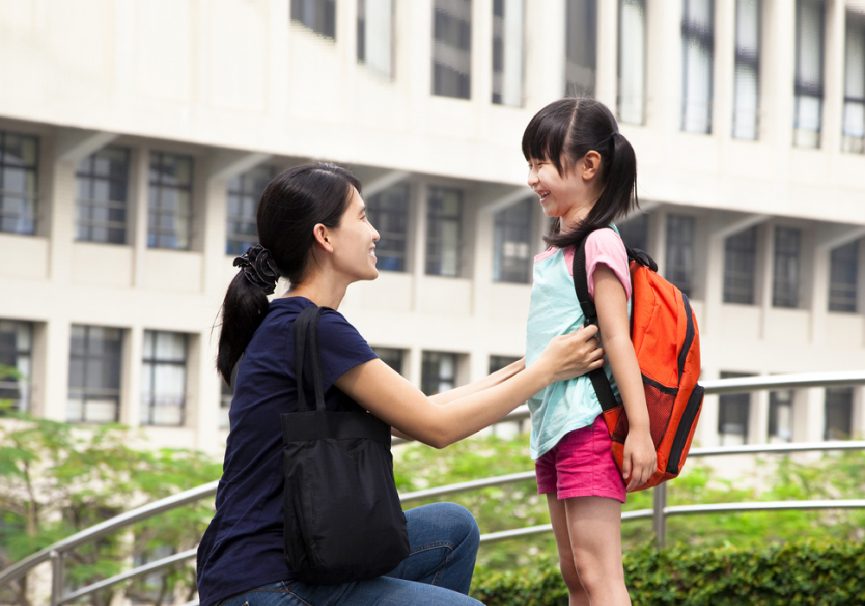Photo by http://parentsindia.com
Going to school is more than A, B, C, and 1, 2, 3. Going to school is not about fancy pens and cute notebooks or whose school bag is the prettiest. More than anything, going to school is about self-regulation – of the child, as the mother (or father), of the yaya (nanny) and the driver, if the entourage involves them, too.
To help a child get ready for school, parents are the first who need to learn self-regulation. We see children rushing to school, sometimes without breakfast, changing their clothes inside the car. We see parents bargaining with the school guard to allow their child entry when the gate has closed, all because the parent has not regulated the time for the child to go to bed the night before and to enforce the wake-up time in the morning.
Going to school, for a child, means self-regulation for the entire household. Is the breakfast ready? Has the daily snack and lunch been planned, prepared, and packed? Is the uniform ironed? Has everything needed to be brought to school been prepared, at least the night before?
Has the driver been given clear instruction when to report for duty? For commuters, have you researched which route is easiest to get through to school and which mode of transportation is least disruptive? And by the way, one school bus commuter running late will create a chain reaction of tardiness for the entire busload of students!
A toddler still needs 10 hours of sleep every day and a parent of a toddler, eight hours. If sleep deprivation is a daily occurrence, how would a day spent in school (and at work) be enjoyable and productive? Without adequate preparation and the wise anticipation of problems, the next day becomes a chaotic, noisy, weary, and blurry drag.
Routines and rituals are not without their benefits. In fact, the first rule of the Montessori Method is order.1 Order makes a child feels safe. Is there order in the family? Self-regulation means regularity. Is there a regular time for meals, a regular time and place for bed, a regular time and place for study, regular people surrounding the child, and a regular person to pick up the child after school? Routines make for efficiency when we regulate time and space for people to go about doing certain activities regularly.
In the ecology of human development, according to Urie Bronfenbrenner,2 the family is the micro-system where a human being learns how to behave, feel, and think. What the family values become rituals in personal disciplines and communal behavior. Sitting down for breakfast together is a ritual. Saying a proper goodbye before leaving the house is a ritual. Setting aside time for homework is a ritual. Observing “lights out” and silence for everyone to get a proper sleep is a ritual. Structure and predictability facilitates self-regulation.
Related Posts
-
Creating a Family Culture
Our family practices, routines, and habits all contribute either to the richness or poverty of…
-
Developing a Culture of Personal Excellence at Home
Here are a few nuggets of wisdom from Mr. Francis Kong himself.
-
Developing Your Children’s Leadership Potential
The best time to develop leaders is while they are young. Parents can make or…
As a kindergartener, I was brought to school every day and afterwards picked up by my mom. Rain or shine, I could see her among a throng of “fetchers.” You might think I was an only child. No, I am the seventh of nine children. Every morning, we had breakfast of milk and egg. One time I missed the milk, my father came to school to ask permission for me to go back home to drink my milk. That sense of regularity that speaks of safety, security, and significance provided me with the foundation for self-regulation.
As a professor of 20 years, I have not submitted any grading sheet late as when I was a student who completed four academic degrees in schedule. The first requirement for my students is to submit their papers on time. People who have problems with time management have a more serious problem with self-regulation. I have seen too many students unable to complete their graduate degrees, unfortunately, because of lack of self-regulation.
Self-regulation — and a lack thereof — does make or break success. And it is learned while young.
_______________________________________
1 Montessori, Maria. (1982). The Secret of Childhood. Ballatine Books.
2 Bronfenbrenner, Urie. (1981). The Ecology of Human Development: Experiments by Nature and Design. Cambridge, MA: Harvard University Press.

Dr. Grace Koo is a full professor of educational psychology at the University of the Philippines, Diliman. She writes, speaks, reads, teaches, and learns with self-regulation.
Related Posts
-
Creating a Family Culture
Our family practices, routines, and habits all contribute either to the richness or poverty of…
-
Developing a Culture of Personal Excellence at Home
Here are a few nuggets of wisdom from Mr. Francis Kong himself.
-
Developing Your Children’s Leadership Potential
The best time to develop leaders is while they are young. Parents can make or…




